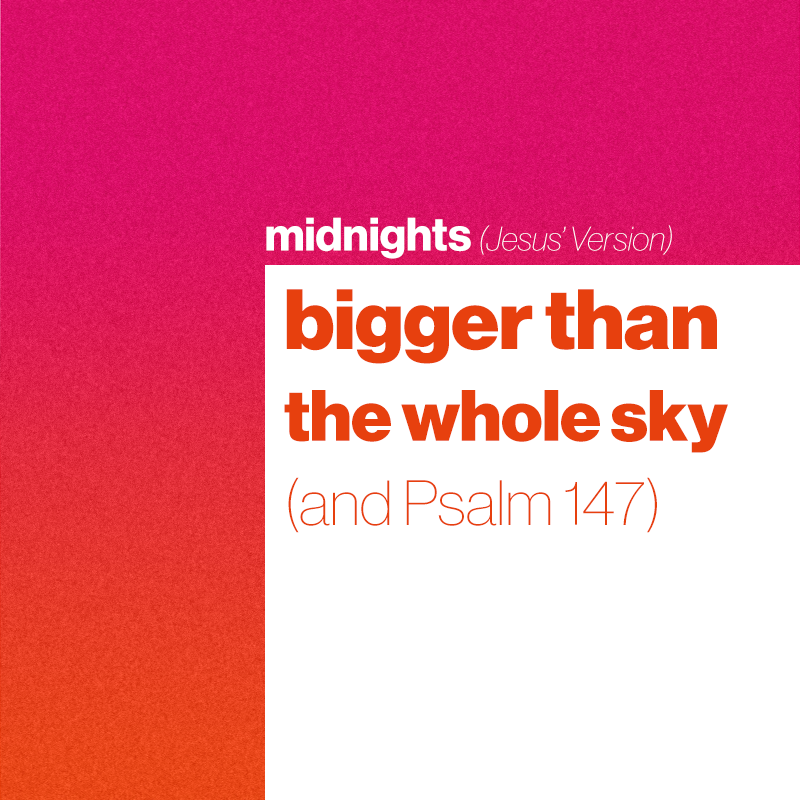Midnights (Jesus’ Version): Bigger than the Whole Sky
My friend texted me the day Midnights came out, “which song do you like the most?”
“I haven’t finished the album yet,” I replied.
“I know which song is yours,” she texted right as I started listening to “Bigger that the Whole Sky.”
“NOT ME CRYING AT THE GYM TO BIGGER THAN THE WHOLE SKY.” I replied after finishing the song. I honestly would have been disappointed if the album didn’t contain a song that made me want to cry. I do love a good sad song.
No words appear before me in the aftermath
Salt streams out my eyes and into my ears
Every single thing I touch becomes sick with sadness
'Cause it's all over now, all out to sea
Goodbye, goodbye, goodbye
You were bigger than the whole sky
You were more than just a short time
Yes, this is a heartbreak song, but it mourns the dream of what could have been more than the reality of what was. It is a special kind of sorrow, the death of hope, the confusion of why things happened the way they did, and the awareness that it was good, even if just for a short time. Taylor wrestles with the heaviness of the “maybes.” Maybe, if she had prayed harder, this wouldn’t have happened. Maybe fate pulled the wrong way. Maybe she wasn’t enough. This doesn’t have to be about a romance. It could be about a friendship, a dream, or a goal. Some speculate that this song is about a miscarriage, and that wrecked me.
Regardless, Taylor is grieving loss, and we, alongside her, feel the depth of it’s impact: it feels bigger than the whole sky. Loss hangs over us and feels immoveable, just as the sky is immoveable. The presence of what was haunts us like a cloud, and the only way for heavy clouds to disappear is for them to unload their burdens to the ground.
Psalm 147 tells us another song about heartbreak:
The Lord builds up Jerusalem;
he gathers the exiles of Israel.
He heals the brokenhearted
and binds up their wounds.
He determines the number of the stars
and calls them each by name.
Great is our Lord and mighty in power;
his understanding has no limit.
He covers the sky with clouds;
he supplies the earth with rain
and makes grass grow on the hills.
He hurls down his hail like pebbles.
Who can withstand his icy blast? (2-5, 8, 17)
The Psalmist is mourning the loss of his people, the exiles in the land. They are brokenhearted, confused and scattered. But he doesn’t declare his loss as bigger than the whole sky. He declares God’s power as bigger than the whole sky. In his loss, he sings praise to the Lord, because God determines the stars in the sky. He is bigger than the whole sky. He extols the Lord in his confusion because God controls the clouds. He is bigger than the whole sky. He honors the Lord in his hurt, because God is over the hail and ice. He is bigger than the whole sky.
I shouldn’t be surprised as how perfectly this Psalm completes the chord of truth Taylor hits, but I do chuckle at how the Lord led me to a Psalm that not only addresses broken heartedness but explicitly says that the LORD IS BIGGER THAN THE WHOLE SKY.
He is present in your hurt, and it is not too big for Him. He is present in your loss, and it is not too big for Him. He is present in your grief, and it is not too big for Him. He doesn’t diminish the impact of our emotions or suffering, but He gently guides our hearts to praise Him in the midst, because He is indeed bigger.
We are called to look at our loss in the face and say, “God is bigger than your heaviness. He is bigger than the whole sky.”
With this, we conclude our series Midnights’ (Jesus’ Version). Up next, some Christmas content (unless Taylor throws a curveball and rereleases Speak Now before the end of the year)! Don’t worry, I haven’t forgotten about the Fruits of the Spirit. 2023 will see the conclusion of that series.
Hannah



